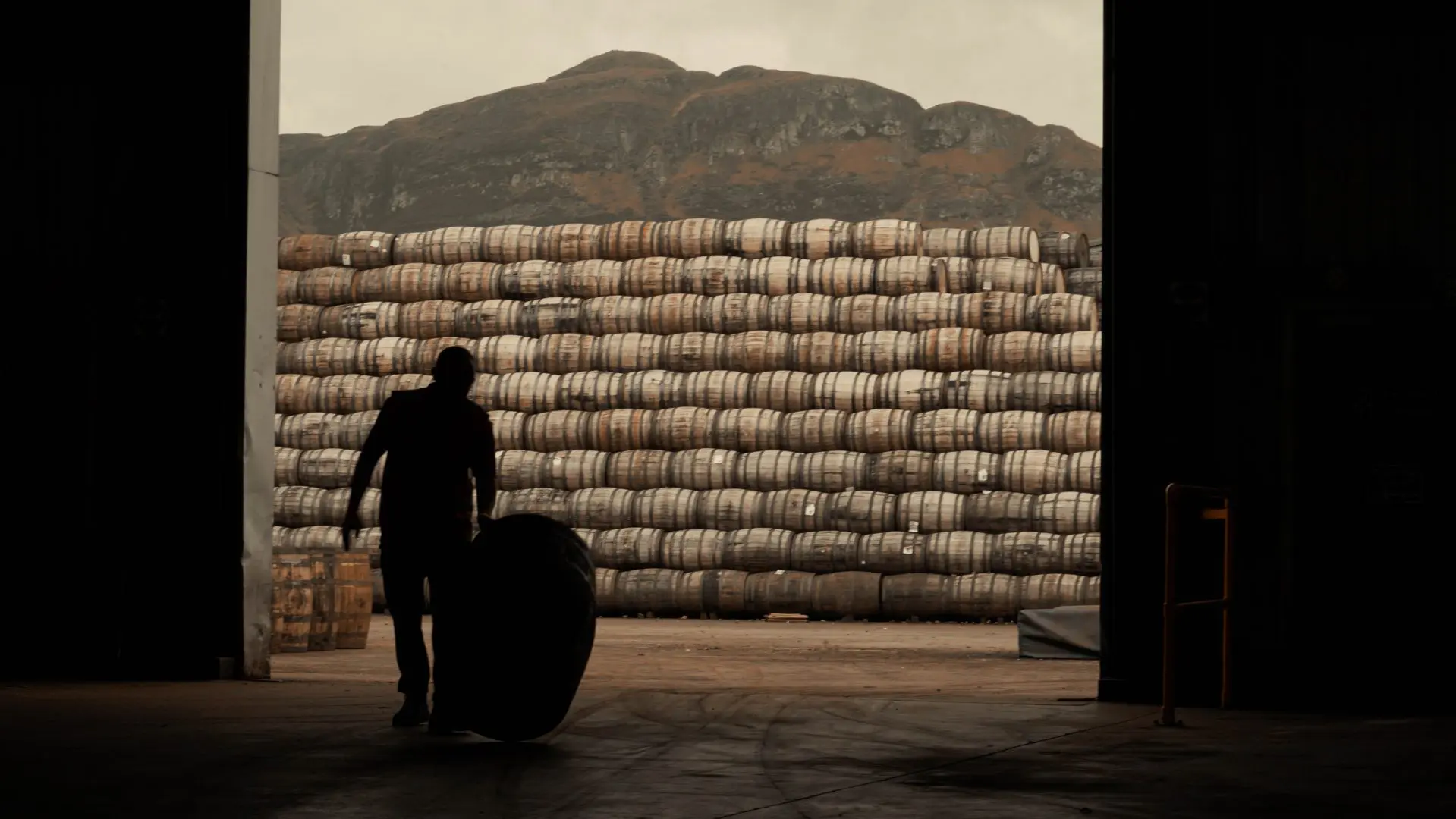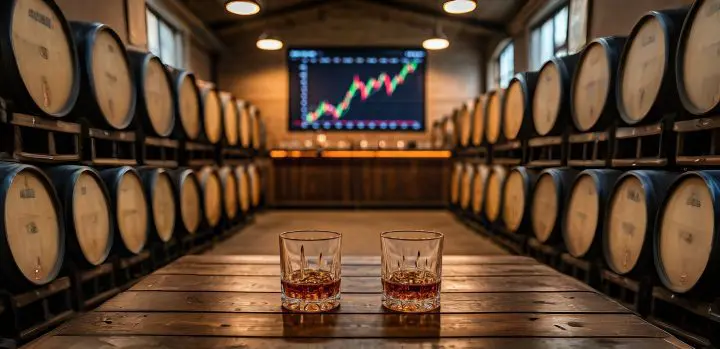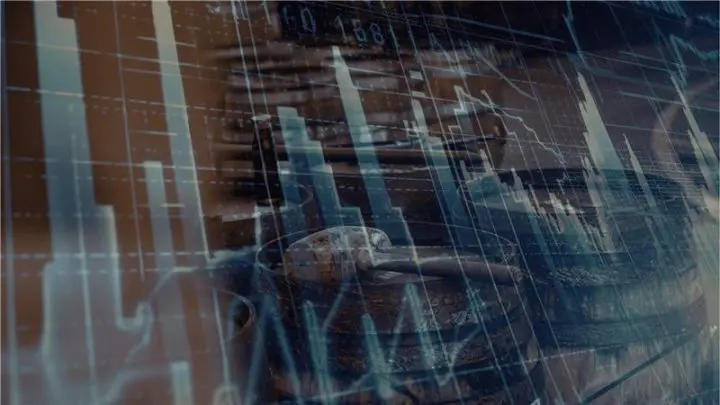
Is it Worth Investing in Whiskey Casks, Rare Bottles of Scotch or Irish Whiskey?
As with any investment, the short answer is that it depends. Whiskey casks have enjoyed an upward trajectory throughout much of the 21st Century. But there are a few factors that can contribute to the degree of this appreciation. Rare bottles of whiskey, for their part, also tend to increase in value, but this isn’t to say that every bottle of whiskey will experience increases in value, nor will these increases occur at constant rates.
According to the 2021 Knight Frank Luxury Investment Index, which tracked the auction results of bottles of Scotch single malt, the value of these rare whiskies increased at a rate higher than that of cars, art, or fine wine. While whiskey proved a good investment through the first few months of the Covid-19 pandemic, it’s difficult to say whether this will continue indefinitely. The market is still relatively new. As Rare Whisky 101’s Andy Simpson noted, ‘…some research we undertook with the University of South Africa in 2019 showed that Scotch whisky, when used as an investment, had no correlation with traditional markets.’
As a result, it can be difficult to use more traditional investments to predict the exact degrees to which bottles of rare whisk(e)y or premium whisk(e)y casks may increase. Nonetheless, there are a few characteristics that can contribute to a bottle or cask increasing in value. Read on for our guide.
Can whiskey be an investment?
At the risk of sounding overly simplistic, yes – whiskey can be an investment. To that end, of course, nearly anything has the potential to be an investment. Mid-century furniture, antiquarian books, and obscure records can also all be investments, but perhaps not always the types of investments that will provide returns beyond one’s own personal enjoyment.
As for whether whiskey can be an investment that provides significant financial returns, we’ve certainly seen this happen in a number of cases; however, it’s difficult to make an absolute statement on whether a particular bottle or cask will perform identically to other similar ones that have sold previously. When looking at casks and bottles, you’ll want to consider the criteria below to maximise your potential for returns:
Types of whiskey to invest in that will increase in value
It’s often thought that the older a cask of whiskey is, the greater its value will be – but you might be surprised to learn that that isn’t always true. While age does play a sizable role in determining the value of a cask, rarity and brand recognition are far more significant factors.
These three determinants are often intertwined. For example, a premium brand primarily produces casks for use in their own future products. They’re likely to produce fewer casks overall than a large-scale distillery producing unbranded casks, and fewer yet of these premium casks will become available to investors.
While it’s likely that both the branded and unbranded casks will have increased in value after 25 years, the branded casks have much greater potential for significant appreciation. With both the provenance of a renowned distillery and the scarcity of comparable casks on the market, a branded cask may be more likely to attain higher results at auction.
A branded cask also carries the distinct advantage of being able to be sold back to the distiller who originally produced it. With Irish whiskey demand forecasted to outstrip production if both continue at current rates, mature casks are likely to be especially attractive to distillers looking to build up their reserves of their own aged stocks. Whiskey distillers could feel compelled to buy back old stock, and may do so at a premium.
If you’re interested in investing in rare bottles of whiskey, rather than casks, there are a few additional aspects you’ll want to consider:
– Has the whiskey won any awards? When industry experts bestow accolades on a particular bottle of whiskey, we tend to see a significant increase in its value. Of course, if you’re purchasing a bottle before it’s had a chance to earn any acclaim, it can be difficult to predict whether it’s going to increase in value for this reason alone. Conversely, purchasing a bottle after it’s received a number of awards (and no longer available from the distiller) could mean that you’ll end up paying more initially and the increase in value over time may not be as significant as it might have been had you purchased it in its initial release.
– Was the whiskey produced to commemorate or celebrate a special event? When a whiskey is produced to commemorate a world event, like a coronation, or a milestone cask being bottled, high-end distillers will often mark the occasion by producing special edition bottlings that are objets d’art in their own right. They may work with master craftsmen or collaborate with renowned artists to create bespoke packaging or incorporate other of-the-moment elements. These luxury whiskey bottles are de facto collector’s items, and the links to moments in time and significant aesthetic figures endow them with added potential for increases in value.
– Does the whiskey come from a renowned brand? At this point, most people know a ‘spirits geek’ with a penchant for sneaking off on weekend trips to raid the nearby small-town bottle shops for forgotten bottles of once-ubiquitous spirits now on strict allocation. But buying bottles you think could become ‘whales’ one day isn’t generally considered the best investment strategy. When purchasing bottles, you’ll want to look at whether it’s been produced by a well-known luxury brand. These brands will likely already have devoted followings; these fans drive demand and may be interested in purchasing your bottle someday to complete a set or fill another gap in their collections.
Is whiskey a better investment than gold?
While much has been made of recent rare bottle sales and investing in ‘liquid gold,’ it’s difficult to say whether whisky could be a better investment than gold. While the price of gold was consistent for many years, it’s recently seen spikes and greater degrees of fluctuation than in many years past. For this reason, investors may now be more uncertain about entering the gold market.
But for those who may have considered buying gold bullion, investing in whiskey casks may be an interesting alternative to explore. Like gold bullion, cask whiskey is an asset-backed investment in an established market that’s historically tended to see consistent returns; however, the two differ in a number of areas.
While gold bullion can be purchased from financial institutions, cask whiskey tends to be offered primarily by brokerage firms. As an emerging alternative investment, the cask whiskey industry is largely unregulated at this time and precious few others share our commitment to compliance. Additionally, when one purchases gold bullion, one is expected to provide one’s own storage and insurance for the bullion; when investing in cask whiskey with Whiskey & Wealth Club, we take care of all of this (in addition to any additional regulatory fees) on your behalf.
Ultimately, whether whiskey is a better investment than gold is a personal decision. Wherever your investment interests lie, it’s important to do thorough research and ensure that you’re working with a reputable company should you choose to invest.
Cask whiskey ownership with Whiskey & Wealth Club
If you are considering investing in cask whiskey, why not explore your options with our team? With years of experience in a diverse array of financial services, they’ll be able to provide the expertise you need to make an informed decision – check out these third party Whiskey Wealth Club reviews and get in touch with us today.

